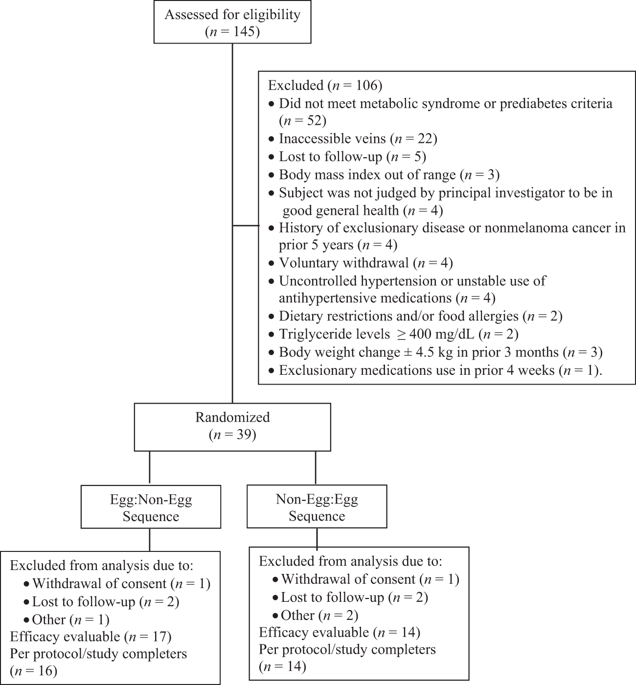当前位置:
X-MOL 学术
›
Eur. J. Clin. Nutr.
›
论文详情
Our official English website, www.x-mol.net, welcomes your
feedback! (Note: you will need to create a separate account there.)
Effects of substituting eggs for high-carbohydrate breakfast foods on the cardiometabolic risk-factor profile in adults at risk for type 2 diabetes mellitus.
European Journal of Clinical Nutrition ( IF 3.6 ) Pub Date : 2020-03-09 , DOI: 10.1038/s41430-020-0599-2 Kevin C Maki 1, 2, 3 , Orsolya M Palacios 1 , Melvyn W Kramer 2 , Rupal Trivedi 3 , Mary R Dicklin 1 , Meredith L Wilcox 2 , Cathleen E Maki 1, 2, 3
European Journal of Clinical Nutrition ( IF 3.6 ) Pub Date : 2020-03-09 , DOI: 10.1038/s41430-020-0599-2 Kevin C Maki 1, 2, 3 , Orsolya M Palacios 1 , Melvyn W Kramer 2 , Rupal Trivedi 3 , Mary R Dicklin 1 , Meredith L Wilcox 2 , Cathleen E Maki 1, 2, 3
Affiliation

|
OBJECTIVES
To assess effects of egg-based versus non-egg, higher-carbohydrate (CHO) breakfast meals on cardiometabolic health markers in overweight or obese adults with prediabetes and/or metabolic syndrome.
METHODS
This randomized, crossover study included two 4-week dietary interventions, separated by a ≥4-week washout. Subjects incorporated into their habitual diets breakfast meals containing either 2 eggs/day for 6 days/week (Egg condition), or energy-matched, non-egg, higher-CHO-based foods (Non-Egg condition). Dietary intakes, insulin sensitivity, and other CHO metabolism indices, lipid biomarkers, high-sensitivity C-reactive protein, and blood pressures were measured.
RESULTS
Thirty men and women with mean age 54.1 ± 1.9 years and body mass index 31.9 ± 0.7 kg/m2 provided data. Neither diet condition significantly altered insulin sensitivity indices, but the homeostasis model assessment for insulin resistance was significantly (p = 0.028) higher after the Non-Egg vs. the Egg condition. Low-density lipoprotein cholesterol (LDL-C) was decreased from baseline (119 mg/dL) by 2.9 and 6.0% with Egg and Non-Egg breakfasts, respectively (p = 0.023). Systolic blood pressure was reduced from baseline (127 mm Hg) by 2.7 and 0.0% with Egg and Non-Egg, respectively (p = 0.018). Diet records indicated 149 kcal/day higher (p = 0.008) energy intake from non-study foods during the Egg condition; however, weight change from baseline did not differ between conditions.
CONCLUSION
Compared with the baseline diet, consumption of 12 eggs/week for 4 weeks at breakfast was associated with less reduction in LDL-C, and more lowering of systolic blood pressure, than observed with non-egg-based, energy-matched, control foods higher in CHO.
中文翻译:

用鸡蛋代替高碳水化合物早餐食品对有2型糖尿病风险的成年人心脏代谢风险因素谱的影响。
目的评估超重或肥胖的糖尿病前期和/或代谢综合症成年人的鸡蛋饮食与非鸡蛋,高碳水化合物(CHO)早餐餐对心脏代谢健康指标的影响。方法这项随机,交叉研究包括两项为期4周的饮食干预,间隔≥4周。将受试者纳入其日常饮食中的早餐餐,其中包含每天2个鸡蛋/每周6天(鸡蛋条件)或能量匹配的非蛋类高CHO基食物(非鸡蛋条件)。测量饮食摄入量,胰岛素敏感性和其他CHO代谢指标,脂质生物标志物,高敏感性C反应蛋白和血压。结果30名平均年龄为54.1±1.9岁且体重指数为31.9±0.7 kg / m2的男性和女性提供了数据。两种饮食条件均未显着改变胰岛素敏感性指数,但与鸡蛋相比,非鸡蛋条件下的胰岛素抵抗稳态模型评估显着更高(p = 0.028)。鸡蛋早餐和非鸡蛋早餐的低密度脂蛋白胆固醇(LDL-C)与基线(119 mg / dL)相比分别降低了2.9%和6.0%(p = 0.023)。鸡蛋和非鸡蛋的收缩压分别比基线(127 mm Hg)降低了2.7%和0.0%(p = 0.018)。饮食记录表明,在鸡蛋状态下,非研究性食物的能量摄入增加了149 kcal /天(p = 0.008);但是,在不同条件下,体重从基线的变化没有差异。结论与基线饮食相比,早餐时每周食用12个鸡蛋/每周4个星期与降低LDL-C减少有关,
更新日期:2020-04-24
中文翻译:

用鸡蛋代替高碳水化合物早餐食品对有2型糖尿病风险的成年人心脏代谢风险因素谱的影响。
目的评估超重或肥胖的糖尿病前期和/或代谢综合症成年人的鸡蛋饮食与非鸡蛋,高碳水化合物(CHO)早餐餐对心脏代谢健康指标的影响。方法这项随机,交叉研究包括两项为期4周的饮食干预,间隔≥4周。将受试者纳入其日常饮食中的早餐餐,其中包含每天2个鸡蛋/每周6天(鸡蛋条件)或能量匹配的非蛋类高CHO基食物(非鸡蛋条件)。测量饮食摄入量,胰岛素敏感性和其他CHO代谢指标,脂质生物标志物,高敏感性C反应蛋白和血压。结果30名平均年龄为54.1±1.9岁且体重指数为31.9±0.7 kg / m2的男性和女性提供了数据。两种饮食条件均未显着改变胰岛素敏感性指数,但与鸡蛋相比,非鸡蛋条件下的胰岛素抵抗稳态模型评估显着更高(p = 0.028)。鸡蛋早餐和非鸡蛋早餐的低密度脂蛋白胆固醇(LDL-C)与基线(119 mg / dL)相比分别降低了2.9%和6.0%(p = 0.023)。鸡蛋和非鸡蛋的收缩压分别比基线(127 mm Hg)降低了2.7%和0.0%(p = 0.018)。饮食记录表明,在鸡蛋状态下,非研究性食物的能量摄入增加了149 kcal /天(p = 0.008);但是,在不同条件下,体重从基线的变化没有差异。结论与基线饮食相比,早餐时每周食用12个鸡蛋/每周4个星期与降低LDL-C减少有关,









































 京公网安备 11010802027423号
京公网安备 11010802027423号